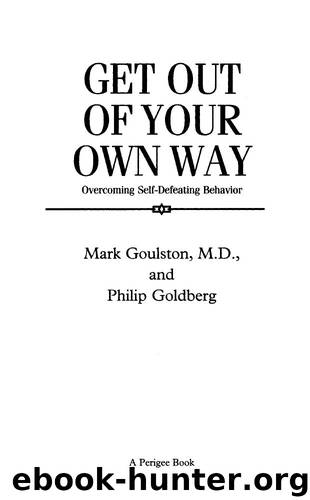Get Out of Your Own Way by Mark Goulston & Philip Goldberg

Author:Mark Goulston & Philip Goldberg [Goulston, Mark & Goldberg, Philip]
Language: eng
Format: epub
ISBN: 9781101657751
Publisher: Penguin Group US
Published: 1996-02-01T00:00:00+00:00
Pretending You’re Fine When You’re Not
“Dare to be true: nothing can need a lie: A fault, which needs it most, grows two thereby.”
—GEORGE HERBERT
John, a 43-year-old hardware store manager, was telling me about an upcoming visit from his parents, who lived out of town. I asked if he was looking forward to seeing them.
“It’ll be fine,” he said.
“You don’t sound very convincing,” I replied.
“Well, they bicker constantly, and criticize everything I do. But they’re in their late seventies, so I guess I’m lucky they’re still alive.”
I pushed John to express what he really felt. He admitted that he couldn’t stand his parents’ visits. “It drains me,” he said. “Nobody enjoys it, not even them.”
John’s typical response was to withdraw into a sullen, pouty silence. His parents would ask, “Is something wrong?” and he would say, “No, no, I’m fine.” In most instances he couldn’t even admit to himself that something was wrong.
This sort of denial is common. Admitting to yourself that you are upset or in pain can make you feel exposed. You fear that acknowledging a bad feeling gives it more power. The pain might get worse. You might not be able to tolerate it. In fact, the opposite is usually true: recognizing a feeling releases pent-up tension and makes you feel better rather than worse.
You might also fear that you won’t be able to say, “I feel bad” without blaming someone. Then you’ll have to either retaliate or, if you blame yourself, feel ashamed. You might even be forced to take action, and that prospect can be frightening: “What if I don’t have the skill or wisdom to make things better?” you wonder. “What if I have to do something risky?” It’s a lot easier to exempt yourself by not admitting you feel bad in the first place.
As I told John, it’s important to realize that being okay doesn’t mean feeling okay all the time. Rather, it means being able to experience appropriate feelings without denial, self-deception or repression. Mentally healthy people feel what they are supposed to feel: when they are angry, they feel anger; when they are sad, they feel sadness. Owning up to the feeling is the first necessary step toward feeling better.
It is also important to realize that acknowledging bad feelings doesn’t mean you have to do anything about them. In fact, telling yourself you feel bad actually diminishes the need to act. It stifles the impulse to take sudden, precipitous action, which could make things worse.
I suggested to John that when his parents started to get to him, he should say to himself, “I hate the way I feel.” He seemed puzzled but agreed to try it. The next time I saw him he said, “As soon as I told myself ‘I hate the way I feel,’ I felt relieved.” He was able to tolerate his parents without pouting or withdrawing—and without blowing up when they continued to annoy him.
Admitting to yourself that you feel bad is, of course, a prerequisite to admitting it to others.
Download
This site does not store any files on its server. We only index and link to content provided by other sites. Please contact the content providers to delete copyright contents if any and email us, we'll remove relevant links or contents immediately.
Rewire Your Anxious Brain by Catherine M. Pittman(18644)
Talking to Strangers by Malcolm Gladwell(13349)
The Art of Thinking Clearly by Rolf Dobelli(10455)
Mindhunter: Inside the FBI's Elite Serial Crime Unit by John E. Douglas & Mark Olshaker(9324)
Becoming Supernatural by Dr. Joe Dispenza(8201)
Change Your Questions, Change Your Life by Marilee Adams(7760)
Nudge - Improving Decisions about Health, Wealth, and Happiness by Thaler Sunstein(7693)
The Road Less Traveled by M. Scott Peck(7594)
The Lost Art of Listening by Michael P. Nichols(7494)
Mastermind: How to Think Like Sherlock Holmes by Maria Konnikova(7323)
Enlightenment Now: The Case for Reason, Science, Humanism, and Progress by Steven Pinker(7306)
Win Bigly by Scott Adams(7184)
The Way of Zen by Alan W. Watts(6601)
Daring Greatly by Brene Brown(6504)
Big Magic: Creative Living Beyond Fear by Elizabeth Gilbert(5756)
Grit by Angela Duckworth(5605)
Ego Is the Enemy by Ryan Holiday(5415)
Men In Love by Nancy Friday(5234)
The Laws of Human Nature by Robert Greene(5173)
